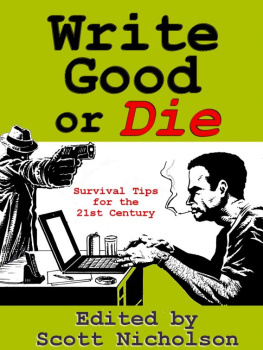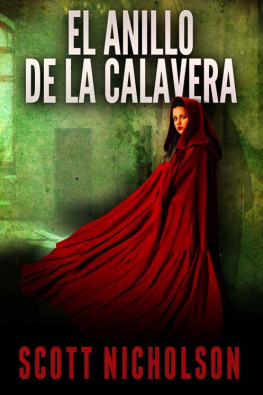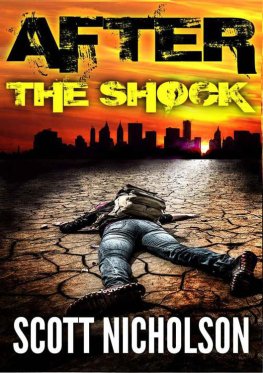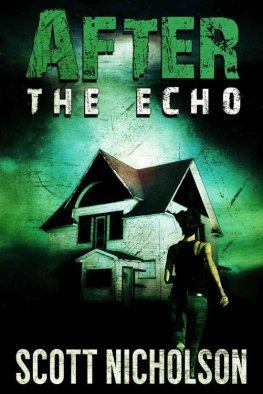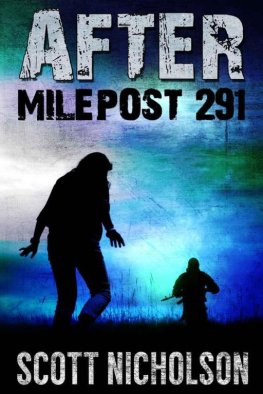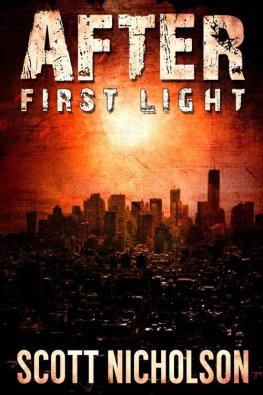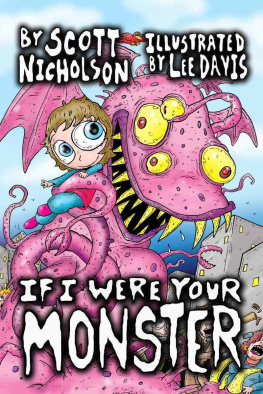Scott Nicholson - Write Good or Die
Here you can read online Scott Nicholson - Write Good or Die full text of the book (entire story) in english for free. Download pdf and epub, get meaning, cover and reviews about this ebook. year: 2010, publisher: Haunted Computer Books, genre: Art. Description of the work, (preface) as well as reviews are available. Best literature library LitArk.com created for fans of good reading and offers a wide selection of genres:
Romance novel
Science fiction
Adventure
Detective
Science
History
Home and family
Prose
Art
Politics
Computer
Non-fiction
Religion
Business
Children
Humor
Choose a favorite category and find really read worthwhile books. Enjoy immersion in the world of imagination, feel the emotions of the characters or learn something new for yourself, make an fascinating discovery.
- Book:Write Good or Die
- Author:
- Publisher:Haunted Computer Books
- Genre:
- Year:2010
- Rating:3 / 5
- Favourites:Add to favourites
- Your mark:
- 60
- 1
- 2
- 3
- 4
- 5
Write Good or Die: summary, description and annotation
We offer to read an annotation, description, summary or preface (depends on what the author of the book "Write Good or Die" wrote himself). If you haven't found the necessary information about the book — write in the comments, we will try to find it.
Write Good or Die — read online for free the complete book (whole text) full work
Below is the text of the book, divided by pages. System saving the place of the last page read, allows you to conveniently read the book "Write Good or Die" online for free, without having to search again every time where you left off. Put a bookmark, and you can go to the page where you finished reading at any time.
Font size:
Interval:
Bookmark:
Today, it is old-fashioned and seldom usedexcept in parody.
Second Person
The "you" tense. (e.g., "You walk down thestreet, not knowing what you're going to find around thecorner.")
Largely experimental and only used for a veryspecific kind of story.
Used by McInerney in Bright Lights, Big City toshow the character's drug-addled state.
Third Person Limited
Told through one character's viewpoint,seeing just what that character sees and thinking just what s/hethinks.
Can switch POV away from that character, butthe story should only be told through one character's viewpoint ata time.
The POV usually breaks between chapters, butcan be done within chapters. However, the writer should give thereader a visual indication that POV is being changedjust skip downa few lines or give some other form of break.
Third person limited is the most-often-usedPOV and the one that, by default, is the best choice for moststories.
[I'm sure David had more to say on thistopic, but he ran out of time.]
Bottom line: In Morrell's judgment, mostfirst-person novels could be improved by a shift to the thirdperson. First person is very hard to doharder than third personlimitedand should only be done with great care by the writer, andonly when the story demands it. Otherwise, especially for newwriters, they're probably better off going with third person.
David J.Montgomeryhttp://www.davidjmontgomery.com
###
18. Whats In A Name?
By Scott Nicholson
http://www.hauntedcomputer.com
Shakespeare said, Whats in a name? Thatwhich we call a rose by any other name would smell as sweet.Gertrude Stein said, A rose is a rose is a rose. John Davidsonsaid, O which is the last rose? A blossom of no name. Anadolescent Scott Nicholson once wrote a snarky line in a wretchedpoem that went A rose is a rose is a risen.
So we could assume we couldname every character Rose and it would make no difference. TokyoRose would be the same as Emily Rose, and Rose Red and Rose Madder could be interchangeabletitles in works by Stephen King. The character of Rose in theworlds most popular movie, Titanic, could have been Sue, andJohnny Cashs song A Boy Named Sue could have been called A BoyNamed Rose and theoretically the universe would have continuedexpanding intact.
But naming a character Rose doesnt connoteblandness or homogeneity. The word comes loaded with a number ofassociations: a flower notoriously challenging for the homegardener; a pinkish-red color in the box of Crayolas; a food sourcerich in Vitamin C; Shakespeares quote; an oft-used symbol for thefleeting and ephemeral nature of love; and all the
Roses you have personally known, as well asall the fictional Roses we encounter, whether the name is first orlast.
Names do matter, and one of the quickest waysthat fiction spoils itself is by having an unbelievable character.You dont want the name to throw up a speed bump for the reader.The name should fit, go unnoticed and therefore easily accepted, orelse be an intentional ploy to draw attention. These last can betiresome: the big biker named Tiny, the pathetic loser calledRomeo, etc. The name doesnt have to do all of the work ofcharacter building, but its an important part of the packagedeal.
Uncommon names are fairly common, asevidenced by a quick thumbing through your local phone book. Athirty-second scan of mine reveals Rollin Weary, Edward Wax, OlettaWaycaster, Webb Weatherman, and Forest Weaver. These real nameswould probably cause your reader to pause upon initial encounter.This isnt necessarily bad, but even real names can be loaded. Ifyour fictional Edward Wax is a candle maker or your Webb Weathermanis a meteorologist, youd better be writing comedy or satire.
One of the most common mistakes is makingyour character name sound too namey. In other words, the namesounds like that of a fictional character instead of a real person.For all my admiration of Dean Koontz, his character names sometimessound artificial, as if churned out by some random charactergenerator (Jimmy Tock, Junior Cain, Aelfric Manheim, MartinStillwater, Harry Lyon, Joanna Rand). However, he is the onlywriter skilled enough to name a serious character Odd Thomas andget away with it.
A fanciful name, even if memorable, can turnyour readers away. My first encounter with Kurt Vonnegut wasthrough his short story Harrison Bergeron, in which the bad guyis a woman named Diana Moon Glampers. I was a little too young tograsp the subtleties of Vonneguts satire, and the name annoyed meso much that I put off reading his work again for years. Now Iunderstand what he was doing, and I still remember that name thoughI havent read the story since.
The sound of the name addstone to the character. While a stone-faced character might well becalled Stony, hes probably more interesting if hes a Chuck orDirk, which are both punchy, hard names ( Mystery Science Theater fans mayremember Biff McLargehuge). A Richard is different from a Dick isdifferent from a Richie is different from a Ricardo. Sue is notSuzannah, Suzie, or Susan. We expect an appliance repairman to benamed Danny, not Danforth, or Fred instead of Frederick. Anattorney or stockbroker will more likely be Charles than Charlie,or Lawrence instead of Larry. Wed probably be more comforted tohave a doctor named Eleanor instead of Muffy, or an airline pilotnamed Virginia rather than Brittany.
A characters name is often the first andmost vital clue to a characters ethnicity, which may or may not beimportant to the story. Vinnie, Su, Ian, Darshan, Mohammed, Yoruba,Yasmine, and Felicia are probably going to create readerexpectations. Names also carry generational weight: we envisionBlanche and Vivian as older, more serious people than we do Dakota,Madison, or Mackenzie.
On the other hand, just as stereotypes areoften full of holes in real life, you can use expectations in adelightful turn of the tables. Instead of a truck driver named Mac,he can be Milton, a sociologist who enjoys traveling. Your New Yorkcabbie doesnt have to be Armaan, who may or may not be aterrorist; he can be Orlando, studying acting in night school. Justmake sure the people, and the motivations that propel them throughthe plot, are valid.
Villains are in their own special nominalclass. Dracula is probably the perfect example. Its practicallyimpossible to pronounce without sinister implications. FreddieKrueger, Darth Vader, and Gollum are fraught with darkness. StephenKing shines at this: Leland Gaunt, Randall Flagg, George Stark(actually a pseudonym for writer Donald Westlake), Percy Wetmore,and probably the best one of all, It.
Of course, King also getsaway with a character having the ubiquitous moniker John Smith,but even this name choice serves a purpose, because Kingsprotagonist in The Dead Zone is an everyman Christ figure. You probably dontwant to call your soul-stealing, heart-munching bad guy BradleyFlowers, though you might sneak that in as a mild-mannered, WalterMitty-type serial killer. Real-life killers like CharlesStarkweather and Richard Speck sound ominous, while other killerslike Albert Fish and Ted Bundy sound like somebodys kindly uncle,so your character names, like all other elements of your fiction,have to be more real than reality.
Female names offer their own opportunitiesfor striking gold or striking out. Thelma and Louise are twonames that, to me, conjure up images of rough, trailer-trash women(I have an aunt named Louise, so that obviously colors myassociation). In the movie, they become self-reliant whilesimultaneously depending on each other. Though they are doomed,they are also strong survivors. I dont think it would have workedif the characters were Cissie and Amber. Save that for theCameron Diaz and Reese Witherspoon road movie.
In the 1950s James Bond world, you could getaway with naming a character Pussy Galore, a lesbian who can becured into heterosexuality by the right hired gun. That wontwork today, not even in genre fiction. Aside from the fact that thegreat majority of book purchasers are female, you dont want tolook stupid. Janet Evanovichs cute, perky, yet often haplessbounty hunter is named Stephanie Plum, while Kathy Reichs tougherand darker-edged forensic anthropologist is called Temperance(Tempe) Brennan. You can tell just by the protagonists names thatthe two series will have different tones.
Next pageFont size:
Interval:
Bookmark:
Similar books «Write Good or Die»
Look at similar books to Write Good or Die. We have selected literature similar in name and meaning in the hope of providing readers with more options to find new, interesting, not yet read works.
Discussion, reviews of the book Write Good or Die and just readers' own opinions. Leave your comments, write what you think about the work, its meaning or the main characters. Specify what exactly you liked and what you didn't like, and why you think so.

